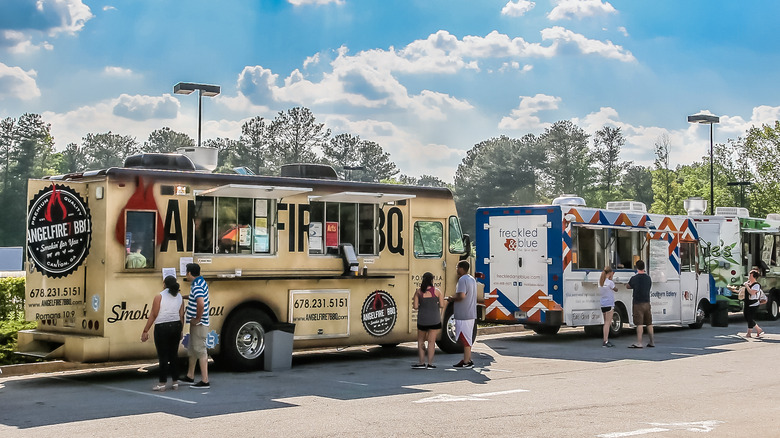The Reason Food Trucks Are Being Hit So Hard By Inflation
There is no doubt that the American consumer is increasingly being affected by inflation, with higher prices felt everywhere from the pump to the produce aisle. As of last month, the food index was up 10.1% since May of 2021, according to data from the U.S. Bureau of Labor Statistics. The gas index for the same time period increased 48.7%.
As a result, consumers are reining in their spending, allocating their money for essentials like food and gas rather than unnecessary purchases like travel and eating out, according to The Washington Post. Naturally, this decline in spending hurts businesses, from beauty salons to roofing companies, as noted in The Washington Post. Of course, with eating outside the home being curtailed, restaurants take a big hit — facing higher costs and fewer customers.
But while all restaurants are hurt by inflation, perhaps none more than food trucks. These restaurants on wheels face the same challenges as other restaurants, with the added expense of the price of gas (via NPR).
Food trucks are not exactly fuel efficient
As you might guess from the size and appearance of a food truck, they are not exactly fuel efficient. M&R estimates that the average food truck gets around 10 miles per gallon and has a 20-gallon tank. That means food truck owners are having to deal with increased costs for supplies, ingredients, and gasoline — really putting a squeeze on the growing industry. As of June 28, 2022, the national average gas price is $4.881 for regular, $5.298 for mid-grade, $5.599 for premium, and $5.787 for diesel, according to AAA. In some states, however, gas price are much higher. In California, for example, regular is $6.308, mid-grade is $6.516, premium is $6.652, and diesel is $6.966 (as of June 28, 2022), according to AAA.
With food truck businesses being traditionally cheaper to operate than a brick-and-mortar restaurant, according to Street Food Central, they usually charge their customers less. However, that could change if food and fuel prices continue to remain high. "If you don't raise up your prices, you're not going to make money. But at the same time, you can't raise it too high cause some customers are going to complain," Yasmany Mendoza, owner of L.A.-based food truck Tacos y Birria La Unica, told NPR.

